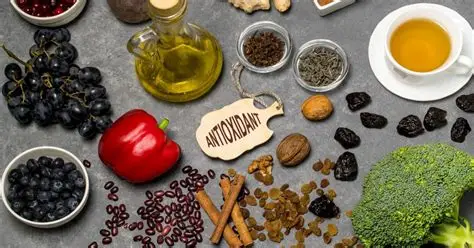Antioxidants shield your cells from harm, which can contribute to chronic illnesses. Understanding how they work and where to get them can help you build a healthy future.
Introduction
Every day, your body confronts attacks from unstable chemicals known as free radicals. These molecules are a normal result of metabolism, but they can also come from other sources such as pollution, cigarette smoke, and processed food.
Free radicals, in small numbers, are not always hazardous. However, when their numbers exceed the body’s defenses, they cause oxidative stress, which can harm cells, proteins, and DNA. Over time, this damage contributes to the onset of chronic diseases such as heart disease, diabetes, cancer, and neurological disorders.
Antioxidants, which may be found in a variety of foods and are naturally created by the body, help neutralize free radicals before they do harm. Understanding their role is critical to avoiding long-term health issues.
How Antioxidants Work in the Body
Antioxidants neutralize free radicals by donating an electron, keeping them from damaging healthy cells.
This protective response inhibits the chain processes that cause cell membranes to degrade, proteins to malfunction, and DNA to mutate.
The body naturally manufactures some antioxidants, such as glutathione, but it also depends extensively on nutrients from food, such as vitamins C and E, selenium, and plant-based substances like flavonoids and carotenoids.
Without adequate antioxidant defenses, oxidative stress can hasten aging and contribute to chronic disease progression.
MUST READ:The 9 Best Herbs for Joint Pain
Antioxidants and Heart Health
Oxidative stress plays a significant part in the development of atherosclerosis, which is the accumulation of plaque inside arterial walls.
This process begins when free radicals damage LDL cholesterol, increasing its likelihood of sticking to arteries and causing blockages.
Antioxidants such as vitamin E, polyphenols from berries, and flavonoids from green tea assist to prevent this damage by increasing blood vessel elasticity and decreasing inflammation.
Diets high in antioxidant-rich foods such as fruits, vegetables, nuts, and whole grains have been consistently associated with a lower risk of heart disease and stroke.
Antioxidants and Cancer Prevention
When free radicals damage DNA, mutations can occur, resulting in uncontrolled cell proliferation, which is a characteristic of cancer.
Vitamin C, carotenoids (such as beta-carotene and lycopene), and selenium are antioxidants that protect DNA and assist the body’s natural repair mechanisms.
While no single vitamin can ensure cancer protection, research indicates that diets high in antioxidant-rich foods are linked to a lower risk of numerous malignancies, including lung, stomach, and breast cancer.
However, high-dose antioxidant supplements have not been demonstrated to be beneficial and may even be detrimental in some situations, thus food sources are the safest option.
Antioxidants and Diabetes Management
People with diabetes have increased amounts of oxidative stress, which can harm blood vessels and nerves.
Fruits and vegetables contain antioxidants such as alpha-lipoic acid, vitamin E, and flavonoids, which can enhance insulin sensitivity and reduce inflammation.
Regular consumption of antioxidant-rich foods also promotes blood vessel health, which reduces the risk of diabetes consequences such as neuropathy, kidney disease, and eye issues. While antioxidants are not a solution for diabetes, they can help reduce the long-term harm caused by elevated blood sugar levels.
Antioxidants and Brain Health
The brain is extremely sensitive to oxidative stress due to its high oxygen consumption and lipid-rich structure.
Antioxidants such as vitamin E, C, and polyphenols found in dark chocolate, green tea, and berries can help protect brain cells from harm.
According to studies, antioxidant-rich diets are associated with a lower risk of Alzheimer’s disease, Parkinson’s disease, and age-related cognitive decline.
Some antioxidants, such as flavonoids, may also improve blood flow to the brain, promoting memory and learning.
Best Food Sources of Antioxidants
Fruits including blueberries, strawberries, oranges, and grapes are high in vitamin C and flavonoids.
Leafy greens like spinach and kale contain beta-carotene and lutein. Nuts and seeds provide vitamin E, but seafood and Brazil nuts are high in selenium.
Herbs and spices like turmeric, cinnamon, and oregano are also rich in antioxidants. Eating a variety of these meals on a daily basis guarantees that you receive a wide range of defensive chemicals.
When to See a Doctor
Antioxidants are beneficial, but they are not a substitute for medical treatment. Consult a healthcare provider if you have
- Chronic sickness symptoms include persistent fatigue, unexplained weight loss, and continuous inflammation.
- A family history of cardiovascular disease, cancer, or neurological illnesses
- Questions concerning whether antioxidant supplements are safe for you, especially if you have a chronic disease or use prescription medications.
Final Thoughts
Antioxidants are essential for protecting your cells from harm, which can lead to chronic disease. They help slow the course of aging by neutralizing free radicals, support organ function, and lower the risk of illnesses such as heart disease, diabetes, cancer, and cognitive decline.
Instead of taking high-dose supplements, the greatest approach to reap their benefits is through a well-balanced, plant-based diet.
Prioritizing antioxidant-rich meals, together with regular exercise, adequate sleep, and medical check-ups, can provide you with the best defense against long-term health issues.


